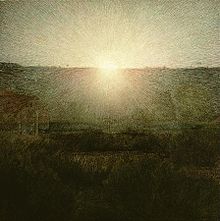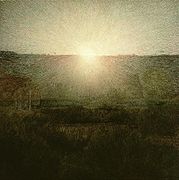Giuseppe Pellizza da Volpedo
Giuseppe Pellizza da Volpedo | |
|---|---|
 | |
| Born | 28 July 1868 |
| Died | 14 June 1907(aged 38) Volpedo, Piedmont, Italy |
| Education | Academy of Brera,Academy of Fine Arts of Florence |
| Known for | Painting |
| Notable work |
|
| Style | Neo-impressionism |
| Movement | |
| Spouse | Teresa Bidone |
Giuseppe Pellizza da Volpedo(28 July 1868 – 14 June 1907) was an ItalianDivisionistpainter. Pellizza was a pupil ofPio Sanquirico.He used aDivisionisttechnique in which a painting is created by juxtaposing small dots of paint according to a specific colour theory. Although he exhibited often, his work achieved popularity in death through their reproduction in socialist magazines and the acclaim they received from 20th-century art critics.
Biography
[edit]Pellizza was born inVolpedo,Italy, on 28 July 1868, to Pietro and Maddalena Cantù and into a wealthy peasant family. He attended the technical school ofCastelnuovo Scrivia,where he learned the first elements of drawing. Thanks to the knowledge gained with the commercialization of their products, the Pellizzas contacted the brothers Grubicy, who promoted the enrollment of Giuseppe in theBrera Academy.There, Pellizza was a student ofGiuseppe Bertini.
At the same time, he received private lessons from the painterGiuseppe Puricelli,followed by lessons fromPio Sanquirico.He exhibited for the first time in Brera in 1885. Ending his studies in Milan, Pellizza decided to pursue a formative apprenticeship in Rome, at first at theAccademia di San Lucaand then at the life drawing school of theFrench Academy in Romeat the Villa Medici.
Disappointed by Rome, Pellizza abandoned the city before expecting to go to Florence, where he attended itsAccademia di Belle Artias a student ofGiovani Fattori.At the end of the academic year, he returned to Volpedo with the aim of dedicating himself to realist painting through the study of nature. Not satisfied with his achieved preparation, he went to Bergamo. There, at theAccademia Carrara,he attended private courses ofCesare Tallone.Then he attended theAccademia Ligustica di Belle Artiin Genoa. At the end of this last apprenticeship, he returned to the region of his birth, where he married a woman from there, Teresa Bidone, in 1892. In the same year, he began to add "da Volpedo" to his signature.

In 1898, he participated in theEsposizione generale italianain Turin. His pictures in these years progressively abandoned impastoed painting to adoptDivisionism,an artistic technique based on the division of colours through the use of small points and lines. Pellizza was confronted with other pictures that used this technique, above all those ofGiovanni Segantini,Angelo Morbelli,Vittore Grubicy de Dragon,Plinio Nomellini,Emilio LongoniandGaetano Previati.In 1891, he exhibited in theTriennale di Milanoto a greater public. He continued his journey throughout Italy at the "Esposizione Italo-Colombiana" in Genoa in 1892 and then a new 1894 exhibition in Milan.
Pellizza returned to Florence in 1893, where he attended the Istituto di Studi Superiori and went on to visit Rome and Naples. In 1900, he exhibited hisLo specchio della vitain Paris, and finishedThe Fourth Estate,to which he had dedicated ten years of study and work.The Fourth Estate,exhibited the next year in theQuadriennale di Torino,did not achieve the recognition he hoped for, and sparked confusion and criticism from even his friends.
Disappointed, Pellizza gave up contact with many writers and artists whom he had kept up correspondence with. After the death of his friendGiovanni Segantiniin 1904, Pellizza took a journey throughEngadin,a place dear to Segantini, to reflect on his teacher's motivations and inspirations for painting. In 1906, thanks to the circulation of his works in national and international exhibitions, Pellizza was called to Rome. There he succeeded in selling a painting (Il Sole) to the Italian state. It was kept in theGalleria di Arte Moderna.
It seemed the beginning of a new period of favour, in which finally artistic and literary groups would recognize the themes of his work. However, the sudden death of Pellizza's wife in 1907 threw the artist into a deep depression. On 14 June of the same year, Pellizza hung himself in his Volepedo studio. He was not yet 40.
Key works
[edit]The Fourth Estate
[edit]
- The Fourth Estate( "Il Quarto Stato") (1901), Pellizza's most famous work, has become a well-known symbol for progressive and socialist causes in Italy, and throughout Europe. The painting is shown during the opening credits of Bernardo Bertolucci's film1900and is currently housed at theMuseo del NovecentoinMilan.[3]An earlier version is held in thePinacoteca di Brera.
- Fiumana(Pinacoteca di Brera, Milan)
- Ambasciatori della fame(Civica Galleria d'Arte Moderna, Milan)
- Il sole(Galleria Nazionale d'Arte Moderna, Rome)
- Carità cristiana(Pinacoteca Malaspina, Pavia)
- L'amore nella vita(Private collection, Lonedo)
- Il sorgere del sole(Private collection, Turn)
- Panni al sole(Private collection, Milan)
- Passeggiata amorosa(Pinacoteca Civica, Ascoli Piceno)
- Prato fiorito(Galleria Nazionale d'Arte Moderna, Rome)
- Statua a Villa Borghese(Galleria Internazionale d'Arte Moderna, Venice)
- Lo specchio della vita(Museo Civico, Turin)
- L'annegato(Pinacoteca Civica, Alessandria)
- Idillio primaverile(Private collection)
- Il morticino(Museo d'Orsay, Paris)
- Sul fienile(Private collection)
- Christian charity(Pavia Civic Museums)
- Ricordo di un dolore(Ritratto di Santina Negri) (Accademia Carrara, Bergamo)
- La sfinge(Private collection, Volpedo)
- Da Monleale(Museo Studio di Pellizza da Volpedo, Volpedo)
Gallery
[edit]References
[edit]- ^"Capolavori dei Musei di Torino - Lo specchio della vita di Giuseppe Pellizza da Volpedo".ArTo Blog(in Italian).Retrieved3 July2018.
- ^"Idillio primaverile".Pellizza da Volpedo(in Italian).Retrieved3 July2018.
- ^"Il Quarto Stato - In Collezione".Museo del Novecento(in Italian).Retrieved3 July2018.
External links
[edit]- Museo Giuseppe Pellizza,Volpedo
- "Pellizza da Volpedo, Giuseppe nell'Enciclopedia Treccani".www.treccani.it(in Italian).




